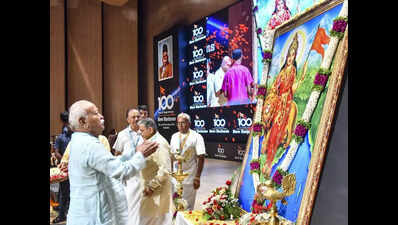Business
RSS Chief Claims Hindu Identity in Tamil Nadu’s Dravidian Ideology

In a recent address in Bengaluru, Mohan Bhagwat, the chief of the Rashtriya Swayamsevak Sangh (RSS), asserted that a “Hindu rashtra” exists in Tamil Nadu, despite the state’s reputation as a stronghold of non-Hindutva politics. Speaking at the conclusion of a two-day lecture series celebrating the centenary of the RSS, Bhagwat characterized Dravidian ideology as a mere political construct.
Bhagwat questioned the essence of Dravidian identity, stating, “What is a Dravidian idea? There are Dravidian parties, and a political atmosphere has been created based on adherence to a political ideology.” He suggested that cultural and religious practices in Tamil Nadu indicate a deeper connection to Hindu identity.
Citing local customs, he remarked, “Don’t they go to temples? Don’t they celebrate Pongal for three days, including one dedicated to cows?” He further claimed that by promoting the idea of equality among religions, Dravidian followers implicitly embrace their Hindu roots. “Once they admit that, then they are all Hindus,” he stated.
During the discussion, Bhagwat encouraged members of the Sangh Parivar to view those who adhere to Dravidian ideology as Hindus. “Once you look at them as Hindus, you will understand them better,” he explained. He criticized Dravidian political parties for distancing themselves from Hinduism, asserting that even if they publicly deny their Hindu identity, they harbor an awareness of it internally.
The RSS leader also referenced the significance of Carnatic music within Tamil culture as further evidence of Hindu influence. He recounted an anecdote involving a prominent Dravidian leader who allegedly requested the cessation of bhajan chants at a temple, claiming that the leader feared he would become a devotee if he heard them.
Beyond his comments on cultural identity, Bhagwat also addressed dietary practices in India, advocating for vegetarianism as a means to reduce beef exports. “Why should meat even be exported? This is a question raised by many people in Bharat. Vegetarianism must be projected in government policies,” he said, while acknowledging the challenge of changing dietary habits in a nation where approximately 72% of the Hindu population consumes meat.
He reassured his audience that Indian authorities only export buffalo meat, citing a central government minister who stated that licenses would be revoked if cow meat was identified in exports.
In addition to cultural and dietary issues, Bhagwat expressed concerns regarding China’s intentions toward India. He emphasized the necessity for a “measured” foreign policy to safeguard India’s sovereignty. “A rising Bharat is not in the interest of China, which will naturally try to curb our country,” he commented. He called for a strategy that would protect India’s interests without escalating to conflict.
Bhagwat concluded with a hopeful note about India’s foreign policy, asserting that it has been successful thus far and expressing a desire for ongoing peace with China, provided it does not come at the expense of India’s territorial integrity.
-

 World5 months ago
World5 months agoSBI Announces QIP Floor Price at ₹811.05 Per Share
-

 Lifestyle5 months ago
Lifestyle5 months agoCept Unveils ₹3.1 Crore Urban Mobility Plan for Sustainable Growth
-

 Science4 months ago
Science4 months agoNew Blood Group Discovered in South Indian Woman at Rotary Centre
-

 World5 months ago
World5 months agoTorrential Rains Cause Flash Flooding in New York and New Jersey
-

 Top Stories5 months ago
Top Stories5 months agoKonkani Cultural Organisation to Host Pearl Jubilee in Abu Dhabi
-

 Sports4 months ago
Sports4 months agoBroad Advocates for Bowling Change Ahead of Final Test Against India
-

 Science5 months ago
Science5 months agoNothing Headphone 1 Review: A Bold Contender in Audio Design
-

 Top Stories5 months ago
Top Stories5 months agoAir India Crash Investigation Highlights Boeing Fuel Switch Concerns
-

 Business5 months ago
Business5 months agoIndian Stock Market Rebounds: Sensex and Nifty Rise After Four-Day Decline
-

 Sports4 months ago
Sports4 months agoCristian Totti Retires at 19: Pressure of Fame Takes Toll
-

 Politics5 months ago
Politics5 months agoAbandoned Doberman Finds New Home After Journey to Prague
-

 Top Stories5 months ago
Top Stories5 months agoPatna Bank Manager Abhishek Varun Found Dead in Well









